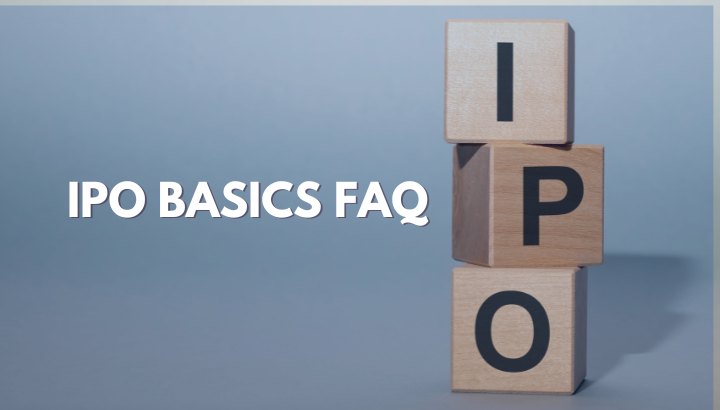
What is an IPO?
When an unlisted company makes either a fresh issue of securities or offers its existing securities for sale or both for the first time to the public, it is called an IPO. This is the process of listing and trading of the issuer’s securities in the Stock Exchanges.
IPO or Initial Public Offering is the very first sale of stock issued by a company to the public.
Initial Public Offering (IPO) is the process by which a company raises money by selling the shares of the company to the general public for the first time. It could be a new or an old company.
What are the criteria to apply for an IPO?
You need to have an online Demat Account. There should be sufficient funds in your Bank account from which you are applying for IPO through the ASBA process. Check the Upcoming IPO.
How can I apply for an IPO?
You can apply IPO through ASBA (Application Supported by Blocked Amount) mode or UPI mode.
For Non-retail bid has to place through ASBA (Application Supported by Blocked Amount) mode with the registered SCSBs. Check ways to improve allotment chances.
What are the different types of investor categories?
Investors are classified under the following categories:
Retail individual Investor (RIIs)
Non-Institutional Investors (NIIs)
Qualified Institutional Buyers (QIBs)
“Retail individual investor” – who applies or bids for securities or issue for a value of not more than Rs. 2,00,000.
What is the price band?
The price band is a band of price within which investors can bid. Ex- The price band on SBI Card is 750-755. The spread between the floor and the cap of the price band shall not be more than 20%.
What is a bid lot?
A Bid-lot is the pre-determined number of shares which have to be applied by an investor. It is different for each issue. There is a minimum lot size which is pre-decided by the company and mentioned in the application form. E.g.: Minimum bid lot in SBI Card IPO is 19 or in multiples of 19 with Price Band (750-755). It means that a retail investor cannot apply for less than 19 shares in that particular issue. The application for more than 19 shares has to be in multiples of 19 like 38, 57, 76, etc.
What is the cut-off price?
A retail investor can bid at any price within the price band or can bid at cut-off. “Cut-off price” means the investor is ready to pay whatever price is decided by the company at the end of the book-building process. While making the application at Cut off, the investor is required to pay the amount at the highest price band. The excess amount, in case the price discovered, is lower, is refunded.
The cut-off option can be exercised only by Retail Investors and Employees of the issuing company applying in the Employee Category. Check ways to improve allotment chances.
Can I change, revise or cancel my bid for an online order?
Yes, you can change or revise or cancel the quantity or price in the bid for online order. However, you cannot modify or revise during:
- Order is sent for processing
- Modification or Revision or Cancellation is not allowed post-cut-off time.
Can I cancel my Bid for online IPO order?
Yes, you can cancel your bid for online order anytime before Modification/ Revision / Cancellation cut-off time.
When can you trade in the new shares?
You can trade in new shares after they are listed on the stock exchange. As per current rules, you cannot do any off-market transfers from your account until the shares are listed on the stock exchange.
Why is my Demat Account No. (DP-ID & Client-ID)?
You can check your DP-ID + Client ID in your back office of Demat Account or contact to your broker. It is very important that the Demat Account Number is stated correctly in the application form. Otherwise, your application got rejected.
Why PAN Number is important?
As per SEBI guidelines, all applicants are required to provide their PAN Number while applying for an Issue. Application without PAN number or with invalid PAN number is rejected. Investors are advised to check their DP account is whether PAN Number is updated properly or not. Check ways to improve allotment chances.
Who is a registrar to the Issue?
A Registrar to an Issue is a SEBI-registered entity who electronically processes all the applications and carries out the allotment process, as per the rules/prospectus. The Registrar is responsible for complying with the time deadlines of updating the electronic credit of shares to the successful applicants, dispatching/uploading of refunds and attending to all investor-related queries after the issue is completed. Usually, the Registrar continues to work with the company, even after the IPO, as its Registrar and Transfer Agent.
How can I know about the subscription status for an issue at any point of time?
The status of subscription status for an issue is available on the website of BSE/NSE on a consolidated basis. The data regarding bids is also available investor category wise. You can also check here.
Where can I check the allotment of shares?
You can check IPO allotments check by visiting the website given below once the allotment is done.
https://www.bseindia.com/investors/appli_check.aspx
https://linkintime.co.in/IPO/public-issues.html
Where can I check the Refunds for non-allotted shares?
Refunds are directly credited by IPO registrar to your Bank account linked to your Demat account on the date of allotment, provided the MICR number in your bank account is updated in your Demat Account.
Whom do I approach if I have grievances with respect to the non-receipt of shares, delay in refund etc.?
You can approach the Registrar to the compliance officer of the issue, whose name and contact number is mentioned on the cover page of the Company’s prospectus or on DRHP. You can also contact your broker regarding IPO related queries.
What is the deadline by which the allotment process would be completed?
As per current norms, the newly issued share has to be listed on or before the 12th working day after the issue is closed. Working backwards, this would generally mean that the allotment process and uploading of the shares, sending of refunds etc. have to be completed within 10 working days from the date of closure of the issue. Check the details of the upcoming IPO.
What is the difference between an Initial Public issue (IPO) and a follow-on public offer (FPO)?
IPO – IPO comprises of an offer for subscription made by such company whose shares are not listed on any stock exchange for trading.
FPO – FPO is an offer made by an already listed company to issue additional securities. For an already listed company, the investor may decide to buy from the market or subscribe to the offer made by the Company.
I have a lot of other things that also need to be considered and those are something that I will cover in my next post.
Happy investing!



